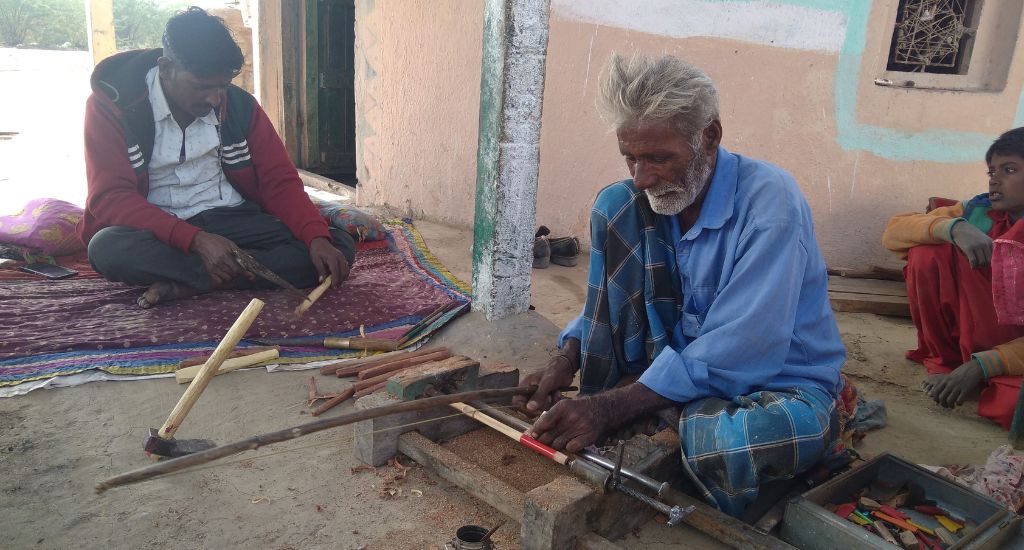On a sunny day, we met Fakirabhai at Misiriyado village in Gujarat’s banni grasslands, home to the Wadha community. He was busy crafting something out of wood, while his son sat beside him. His wife was busy with the household chores.
He belongs to the Wadha or Me, a lesser-known community living in Gujarat. When we asked Fakirabhai about his work, he smiled and shared the history of the work and how their name also represents it.
Wadhas are known to have derived their name from the wooden craft work, which their community has been making traditionally. The Wadha community’s livelihood and sustenance needs are deeply intertwined with the forest resources around.

Traditional hunter-gatherers, the Wadhas are also known to possess hunting, gathering and honey collection skills. They share a mutualistic bond with other maldharis – nomadic communities of herdsmen – in the banni landscape.
Wadha community and its wooden crafts
“I have been doing this craftwork since I was 14 years old. I learnt it from my elders. Earlier we used to make these folding beds (manjis) which were popular and in demand back then,” said Fakirabhai.
He said that the art was declining. Pointing towards his son he said, “The next generation will not do it anymore.” We asked his son Sacchu if he knew how to do this craftwork.
Also Read: Kachchh pastoralists struggle as grasslands shrink in Gujarat
Sacchu, who is in his early twenties, laughed and said “How can we do this work? This requires a lot of hard work and gets meagre pays.”

We learnt that what Fakirabhai was making were wooden utensils. He said that Khamir – a platform representing the crafts, culture and heritage of the Kachchh region – would buy the utensils.
Changes in banni grassland ecology
Fakirabhai explained that the ecology of banni grasslands changed drastically after the 1970s and 80s. Earlier the area was a grassland with various indigenous species of trees and shrubs which supported a huge amount of livestock and the herding communities in the area.
After the 1970s, with the intervention of the forest department, the area under the greenery project was flushed with seeds of the exotic Prosopis Juliflora, popularly called as gaanda bawar, which translates as the ‘mad tree’.
The species became invasive and all the other native species decreased in number. With the decline, the Wadhas did not have enough of the good wood to practise their craft.
Also Read: Banni Maldharis battle to rear cattle in Kachchh
“The wood of the gaanda bawar is not suitable for carrying out woodwork. We don’t have enough meetha bawar tree. So there’s no point in continuing this work. We are not able to maintain the quality of the product because of the lack of the right wood. There’s no demand also,” said Fakirabhai.
From crafters to labourers
The creativity of the Wadhas did not end because of the reduced demand for their wooden crafts. Presently they are the experts in producing charcoal from the P. juliflora wood. Making charcoal is a profitable business. But the Wadhas mainly work as labourers for producing charcoal or take up other menial jobs.

“For producing coal, one has to bear the heat and has to become like coal,” said Jaimalbhai of Dhordo village, one of the labourers.
Though the claim for community forest rights has been filed by other communities in banni grasslands, no claims have been filed by the Wadhas, despite their dependency on the forest.
The future of Wadhas seems bleak in the banni grasslands. The Wadha children don’t have access to education and basic facilities. The communities exist at the mercy of maldharis or NGOs for meagre benefits.
Also Read: Camel herders of Kachchh fall into decline as commons shrink
The lead image at the top shows Fakirabhai of Misiriyado village making wooden utensils that are not in demand as in the past (Photo by Astha Chaudhary)
Dipti Arora and Astha Chaudhary are working with Jaikrishna Indraji Thaker Research Opportunity.








